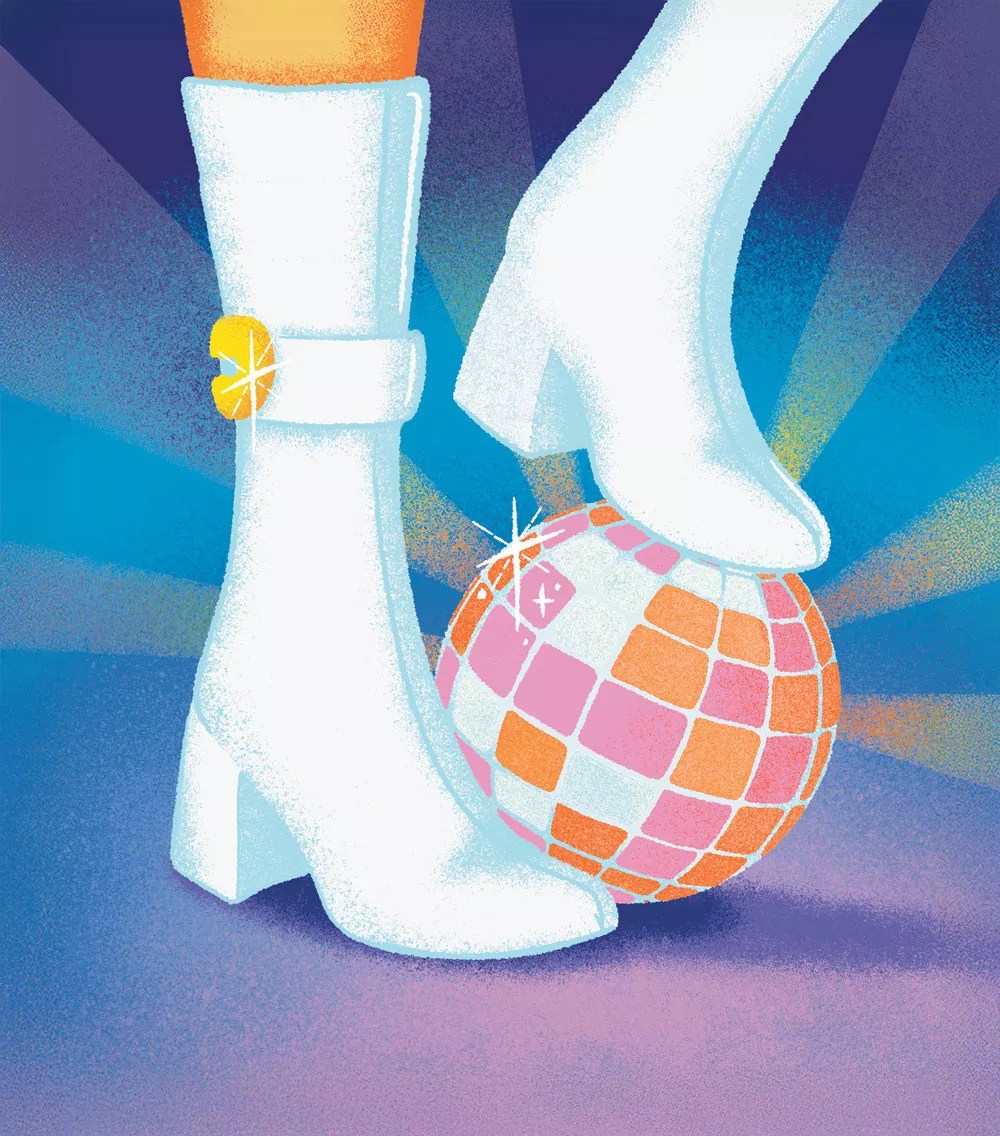
Illustration by Monika Swiderski

Audio By Carbonatix
At the end of March, the Mercury Cafe held one final open mic for those who wanted a last chance to perform on the legendary stage before the fifty-year-old cultural mainstay became The Pearl. A seemingly never-ending string of hopeful musicians took to the stage for a show that went late into the night.
While there was plenty of talent in the room, one standout act drove a large crowd of people out of their seats and onto the dance floor.
Members of the Dead Sinatras, an iconic Denver lesbian band, are no strangers to stirring up enthusiastic audiences at the Merc, which they considered a sacred space. But the open mic act was the group’s first public performance in nearly twenty years.
“It was like riding a bicycle; it just all came back,” says Brandy Herbert, lead guitarist. “All the muscle memory was still there.”
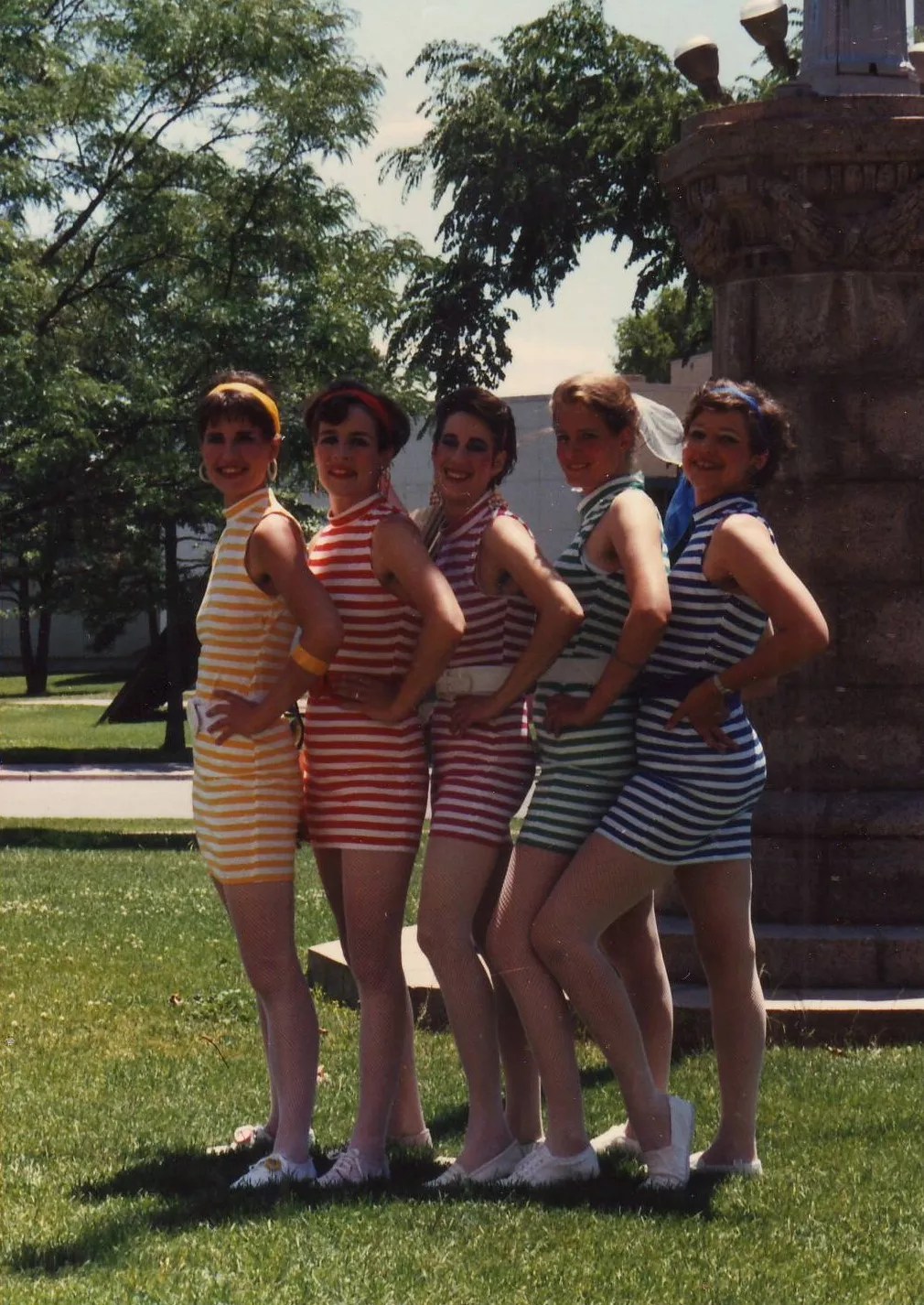
The band was dressed by Lisa Leafgreen, who made the costumes (including the striped dresses pictured here), did hair and makeup, scheduled appointments at salons and more.
Dead Sinatras
The band made waves in ’90s and early 2000s Denver by dressing in drag (which, for this group of lesbians, involved mini dresses, go-go boots, big hair and over-the-top makeup; Westword even awarded the Dead Sinatras “Best Band in Drag” in the 1993 Best of Denver list). Members took on Nancy Sinatra-like personas and performed songs from the ’50s, ’60s and ’70s, sometimes with the lyrics changed.
“We would take what we perceived to be the most sexist songs,” explains Kay Conger, vocalist and alto saxophone player. “Like, if I hated it when I was a kid, it was perfect for us on stage.”
“They were songs that objectify women, sung by women, to women,” rhythm guitarist Kathy Corbett adds.
In 1992, U.S. voters elected Bill Clinton as the country’s president, while Colorado voters approved Amendment 2, a ballot measure that prevented municipalities from enacting anti-discrimination laws protecting gay, lesbian and bisexual people. “So, good news, bad news. It was like a punch in the gut,” Conger recalls.
The band started playing mostly fundraising shows, with proceeds benefiting organizations like The Center on Colfax and EPOC, a group founded to combat Amendment 2. “And we could raise a tidy sum back in the day,” adds Conger, who remembers the band bringing in $24,000 at one show.
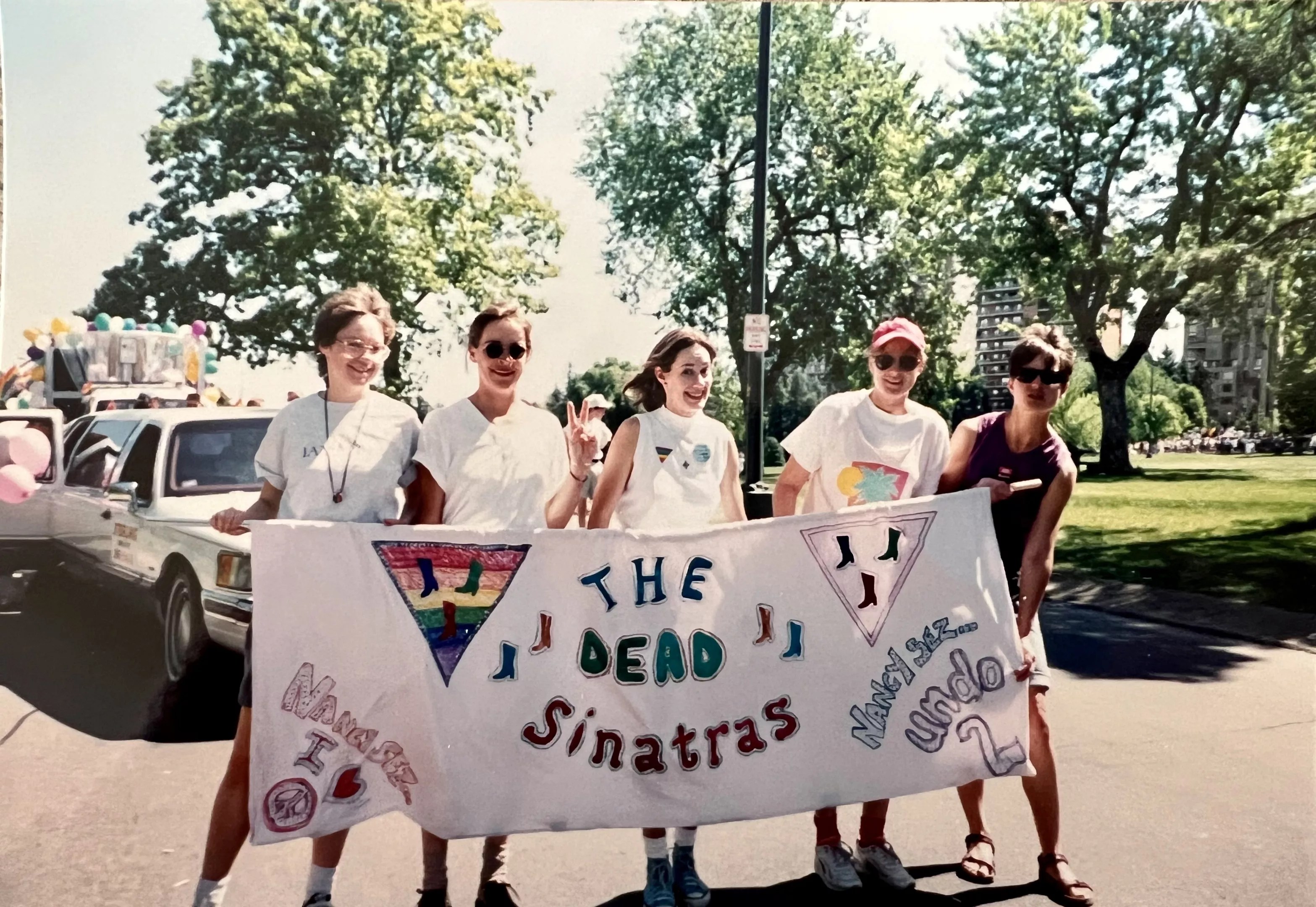
The Dead Sinatras at Denver Pride.
Dead Sinatras
The queer community in Denver has a strong tradition of using music as a form of activism, Corbett says. This Pride Month, the Dead Sinatras want to remind the city’s LGBTQ+ community of its past and encourage musical activism to continue in the present and future.
“I believe in the sublime beauty of playing music with friends,” Conger says. “In our case, friends who embraced the absurdity of the day and were willing to put the work in to sound as good as possible. We weren’t the best musicians, but we had a message and weren’t afraid to broadcast it with an accordion!”

Trumpet player Monica Márquez took drag in the other direction by dressing up as Herb Alpert.
Dead Sinatras
Trumpet player Monica Márquez, who refused the sparkly dresses and took drag in the other direction by dressing up as Herb Alpert during performances, remembers coming out to her family on election night 1992. “I was in my twenties when Colorado was known as the ‘Hate State,'” Márquez says. “We’ve come such a long way, and when I’ve encountered LGBTQ+ people these days who are distressed about attitudes and shifts in where we’re at, I think it’s hopeful for them to see that we’ve been through this before and to draw strength from it.”
In the early 2000s, Corbett recalls, same-sex marriage was being used as a wedge issue by the right; she sees parallels in today’s hostile discourse against trans people. “It’s not different at all,” she says. “We’ve been here before, and we’ll get through it. We’ve seen justice prevail many, many times, and I think we will still. It’s still going to take all kinds of activism. It’s going to take even more music.”
And humor can be its own act of rebellion, Márquez points out.
It certainly was for the Dead Sinatras, which formed for a then-annual lesbian talent show event called the Leaping Lesbian Follies at the Houston Fine Arts Center (then part of the Lamont School of Music in Park Hill). “There was always the lesbian singer-songwriter, folk guitar thing,” Corbett says. “The idea for the Dead Sinatras’ first show at the Leaping Lesbian Follies in ’88 came out of the Leaping Lesbian Follies in ’87, where I was one of those. You know, just a dyke and a guitar, playing tortured love songs,” she laughs. “Mine were a little less tortured. But the night was a long string of us doing that.”
So Corbett, Conger, accordion player Sabrina Green and late acoustic guitar player Mara Pawlowski joined forces for a group act that performed at the ’88 Follies under the name Nancy Goes to Hollywood. They caught the attention of drummer Barb G, who asked to audition. “They just said, ‘Okay, you’re in,’ because they didn’t have a drummer,” Barb says.
Until she was able to afford a set of used drums, Barb’s makeshift kit included a hi-hat, snare and the top of a suitcase she came with to the city. The band decorated the suitcase, and it became the group’s unofficial mascot: “The Green Suitcase Full of Dreams.”
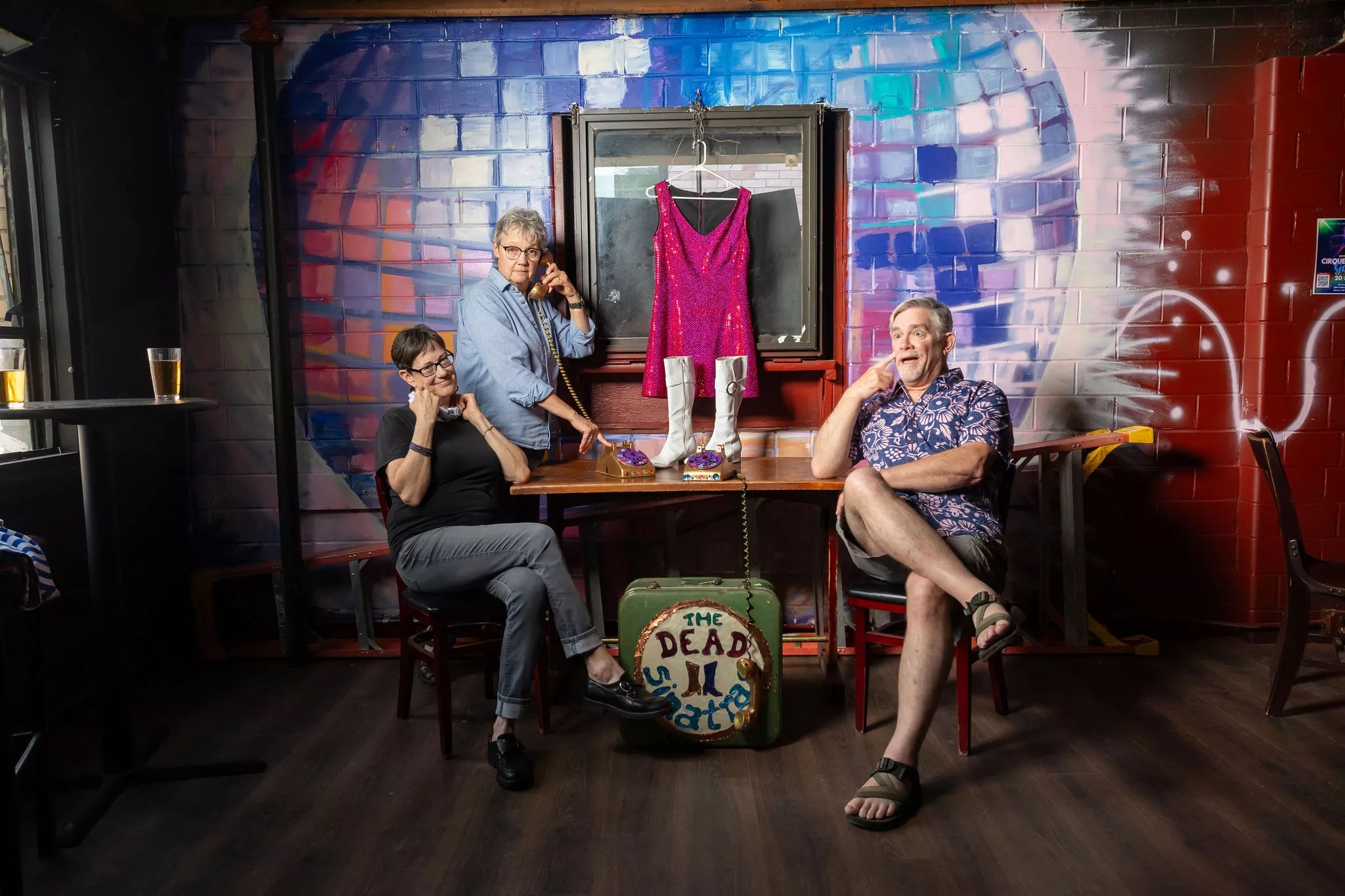
Kay Conger, Kathy Corbett and Kevin Gilmore seated around The Green Suitcase Full of Dreams.
Heather M. Smith
For the Follies in ’89, with Barb and the Green Suitcase in tow, the group performed as the Dead Sinatras. “I think the original plan was to change our name every year if we were in the talent show every year, but then we got asked to play Denver Pride and we didn’t have time to change our name,” Corbett says. “That would’ve been in ’89 or ’90. It was a very sparsely attended year.”
“The AIDs epidemic was raging then,” Conger recalls.
“I remember the sound was so difficult, I couldn’t get near my mic. If I did, the feedback would be enough to send us into the air,” Corbett says.
“It was a rough gig,” Conger says.
But rough gigs were soon polished into smooth shows where audiences took on a life of their own and the band was dressed by Lisa Leafgreen, sort of a den mother to the pack of musicians, who made the costumes, did hair and makeup, scheduled appointments at salons and helped the band however they needed on show days. “She knew how to sew, which made her a unicorn in our circles,” Corbett says.
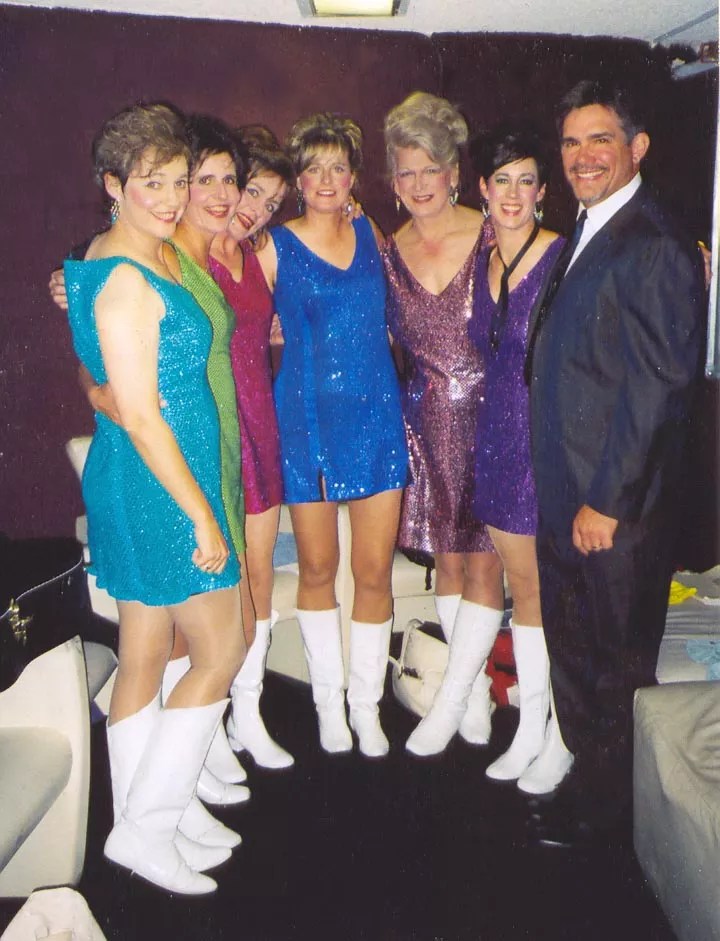
The band in costume.
Dead Sinatras
People moved, went to school and took different jobs, so the band’s members came in and out of the picture. The addition of Herbert, a professional musician with a lot of experience, had really elevated the act’s sound; Márquez and her trumpet joined later. She was in a bowling league with Conger, and after rolling the ball one day, she walked right up to Conger and asked, “What do I need to do to be a Dead Sinatra?”
“We just said, ‘No, you’re in,'” Conger laughs.
Kevin Gilmore (the token straight man in the band whose shtick was that he didn’t know he was playing with a bunch of lesbians) brought his upright bass to the mix, saying he was only there as the “practice bassist,” which the rest of the band denies. Gilmore soon became a permanent band member, donning a sharkskin suit that he jokes “shone like a rare tropical insect.”
While members performed at different times and in different iterations of the band, everyone has fond memories of the Mercury Cafe.
“There are so many musicians who set foot there and it always felt so safe,” Corbett says. “Especially in the beginning, when we were just beginning to gig; it was nerve-wracking. None of us had really been in any kind of consistent band outside of school. The Mercury made it feel so safe and so fun. Anybody who showed up at the Mercury was going to be in our corner, no matter what.”
The group’s first big Mercury Cafe show was as the opening act for Romanovsky and Phillips, a gay singer-songwriter duo. “They did these great songs like ‘Don’t Use Your Penis (for a Brain),‘” Corbett recalls.

As the token straight man in the band, Kevin Gilmore’s shtick was that he didn’t know he was playing with a bunch of lesbians. He performed a number called “I Got My Mojo Working but It Just Don’t Work on You.”
Heather M. Smith
After that, the Merc “just kind of became our place. We had a great relationship with Marilyn,” Conger says of Marilyn Megenity, the venue’s founder. The Dead Sinatras would typically play in the ballroom upstairs, packing the floor with people from all stripes. “We’d have attorneys, people from the disability community. We’d have people break out and do their own thing as an audience,” she adds. “You’d look out and see a conga line or a dance contest going on. The audiences took on a life of their own, and we gave them permission to be their silliest, best selves.”
And members of the Dead Sinatras were being their silliest, best selves, too. They performed songs with lyrics by Corbett, like this one inspired by Deanna Troi from Star Trek:
Fly me to the stars of a distant galaxy
We will search for interplanetary joy
We’ll discover new dimensions and you’ll know all my intentions,
‘Cause you can read my mind, Deanna Troi.
You and me and the Universe, we can telepathically converse
And boldly go where men have never gone.
You can tell me things I want to hear. You’re all big brown eyes and I’m all ears.
We’ll go to warp drive, me and you
On our bridge just built for two
Take me to the Holodeck – you know I’ll be a nervous wreck
but I’ll be your little interstellar toy.
‘Cause somehow from the very start, you beamed yourself right into my heart
Now I’m “Klingon” to your love, Deanna Troi.
And later “Cheney,” set to The Association’s “Windy,” for then-Vice President Dick Cheney, who had a lesbian daughter. Corbett sings: “Who’s from a windy town in Wyoming? Now he lives on the hill in D.C. Who’s even got a lesbian daughter? Everyone knows it’s Cheney.”
“It was fun because people really responded,” Barb says. “I thought it was kind of therapeutic for us and the audience, because it’s letting down the guard. We had a persona on stage, and the audience really responded to us with laughter and dancing.”
The Dead Sinatras’ last public performances were in 2008, including one at an event for Hillary Clinton during the Democratic National Convention held in Denver.
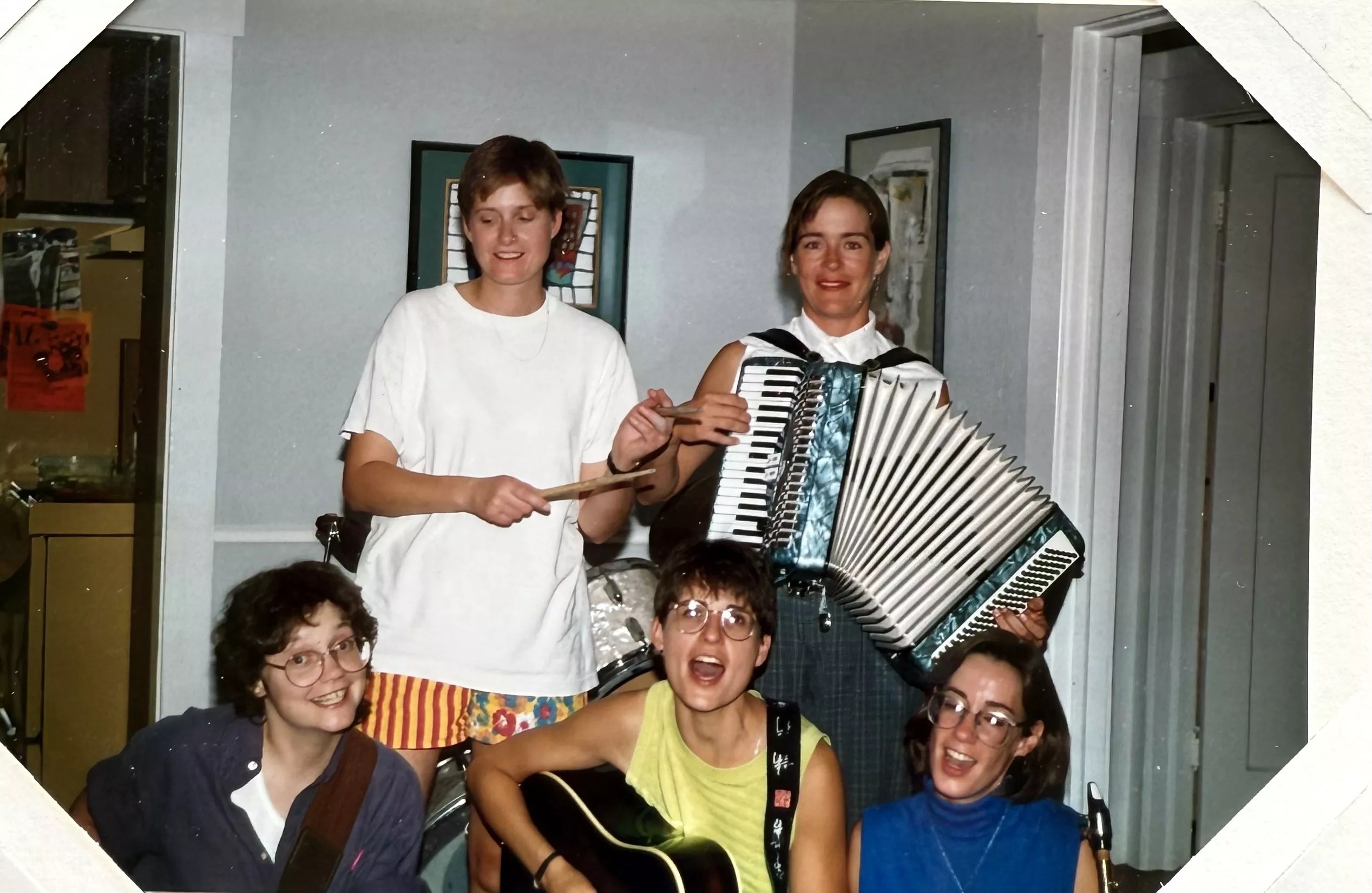
“We weren’t the best musicians, but we had a message and weren’t afraid to broadcast it with an accordion,” Conger says.
Dead Sinatras
Years later, a few of the band members saw an exhibit at History Colorado Center called Rainbows & Revolutions. “It was hung on some really great material, as far as the material culture of the LGBTQ+ community in Denver goes,” Corbett says. “But it was kind of short on things that women had done. To be fair, that wasn’t a deliberate thing. They were dependent on what people had donated.”
“We were like, ‘We should be in that,'” Conger adds. So some of the band’s members recently sat down with History Colorado’s Aaron Marcus and Tara Kaufman to deliver oral histories. They also plan on donating their old costumes. According to Kaufman, the oral histories will be available online and the costumes will be preserved for future generations and put on display if an opportunity arises.
“Queer communities deserve just as much representation as any other person or group, but historically, a lot of museums have excluded those stories,” Kaufman says. “It’s important we don’t keep doing that.”
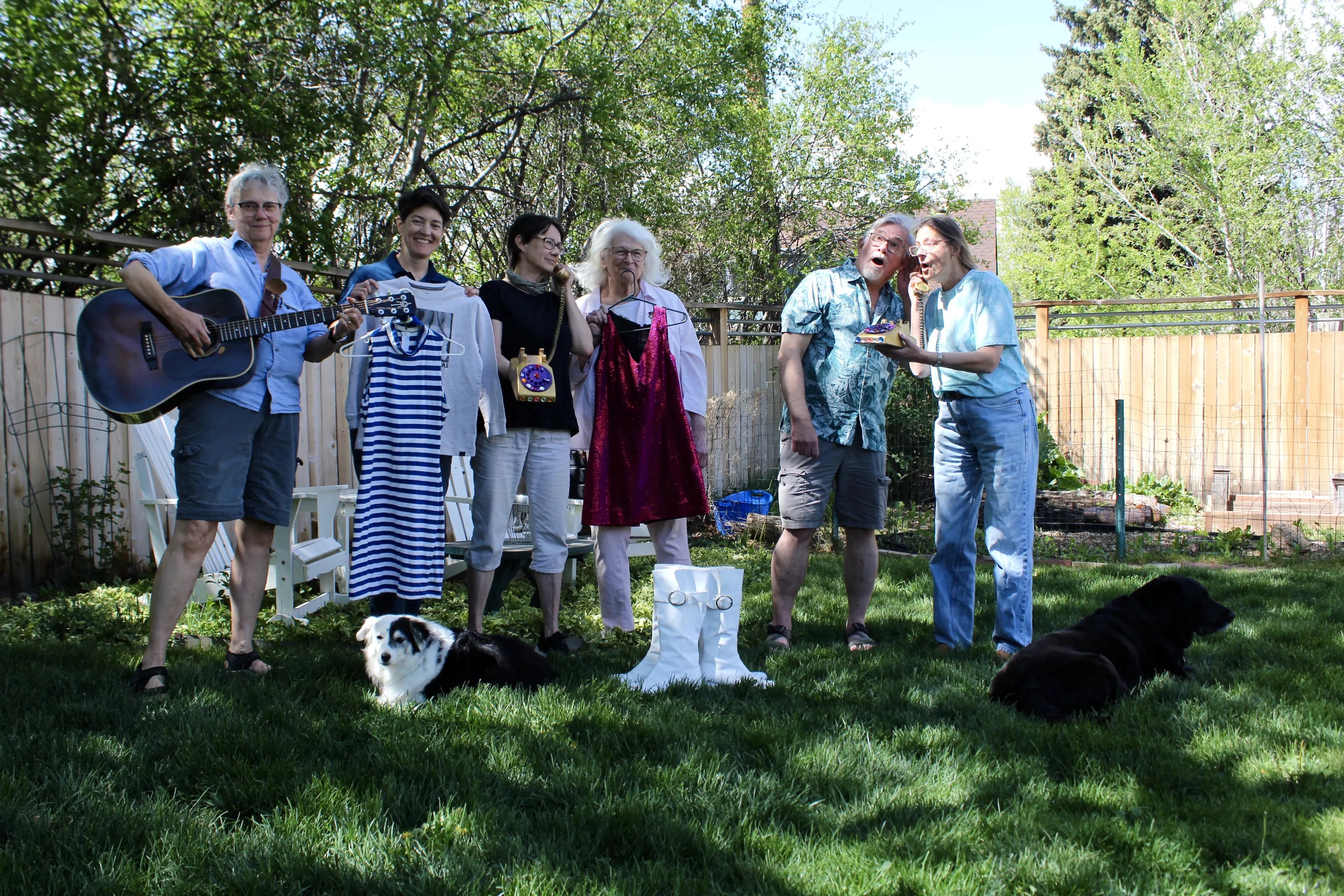
From left to right: Kathy Corbett, Monica Márquez, Kay Conger, Brandy Herbert, Kevin Gilmore and Barb G.
Kristen Fiore
Oral histories can enrich our understanding of the past by providing access to people’s memories and firsthand experiences, she adds: “So when it comes to marginalized groups like the queer community, oral histories can be a way to amplify their voices.”
But the Dead Sinatras aren’t done amplifying their own voices just yet. “Part of me thinks if there wasn’t a time that needed the Dead Sinatras, this is the time,” Gilmore muses.
The audience at the Mercury Cafe’s final open mic would have agreed. But mostly, the band just wants younger queer people to make their own music and fight for what they believe in.
“For musicians today, pick a cause,” Conger says. “Because there are so many. We were all really coalesced around Amendment 2 and the Bush administration. There was just a lot to be angry about, and there’s nothing like a social issue to prompt people to fight fire with silliness.”